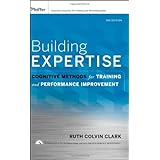
Average Reviews:

(More customer reviews)Are you looking to buy Building Expertise: Cognitive Methods for Training and Performance Improvement? Here is the right place to find the great deals. we can offer discounts of up to 90% on Building Expertise: Cognitive Methods for Training and Performance Improvement. Check out the link below:
>> Click Here to See Compare Prices and Get the Best Offers
Building Expertise: Cognitive Methods for Training and Performance Improvement ReviewWant to know why certain instructional methods work or when they should be used? Want knowledge to improve your credibility as a learning expert with others? Based heavily on cognitive research, this book from well-known expert Ruth Colvin Clark provides the rationale for sound instructional methods.The concepts and guidelines in Building Expertise are mature, widely-accepted, and most will be familiar to readers in the training field. The book's first three chapters explain in simple terms how the brain is thought to work during learning. Each later chapter focuses on a cognitive learning process and summarizes the methods that research has shown support it. With chapter titles like "Leveraging Prior Knowledge," the organization of the book reinforces Ruth Clark's thesis. Her thesis is simple, but profound: it is instructional methods, not media, that influence learning. Some methods work better than others because of the way our brains function. Some methods work better for beginners than for advanced learners. The gems in this book are the occasional information on techniques that sometimes hurt learning and when to avoid them. While there are examples and pictures of training that follow the guidelines, this is not a how-to book. This book explains why and when to do something, not how to do it. For that reason, Building Expertise may be of interest to learning consultants and training managers, as well as to practitioners who want to deepen their knowledge of instructional design.Building Expertise: Cognitive Methods for Training and Performance Improvement Overview
Want to learn more information about Building Expertise: Cognitive Methods for Training and Performance Improvement?
>> Click Here to See All Customer Reviews & Ratings Now

